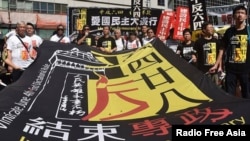Rights activists in Hong Kong say they are planning large public events for this Sunday, June 4.
The events will mark the 28th anniversary of the Chinese military’s attack on pro-democracy activists in the Tiananmen Square area of Beijing.
But the Hong Kong activists must deal with the growing political influence of China’s Communist Party in the city.
The Alliance in Support of the Patriotic Democratic Movement in China organizes a march each year on the anniversary of the Tiananmen massacre.
Richard Choi is deputy chairman of the alliance. He told reporters that the group’s work “will remain unfinished” until the government overturns the official version of what happened on June 4, 1989.
Choi called on people in Hong Kong to gather to show their unhappiness with China’s authoritarian form of government. He dismissed reports that the anniversary events have lost the support of Hong Kong’s younger generation.
“We are still seeing a lot of young people turning out for June 4 events, whether as part of another organization or not,” he told reporters. “And various student groups have held their own memorial activities in various forms over the past two or three years. I think the younger generation does still care about June 4.”
Before Britain surrendered Hong Kong to China in 1997, Hong Kong-ers were promised they would continue to have their traditional freedoms of speech and association. The promises were part of a constitution written by British and Chinese officials. But critics say those freedoms are being weakened. And peaceful demonstrators have recently been charged with crimes. Some experts fear China is trying to suppress popular protests.
Xi Jinping to visit
Lee Cheuk-yan is one of the leaders of the Alliance. He said the protest this Sunday is a chance to show public anger at the government before the 20th anniversary of the Chinese takeover of Hong Kong.
“Nobody is happy with this regime, so they should come to the candlelight vigil as a way of showing our displeasure to President Xi Jinping,” he said.
Xi is likely to travel to Hong Kong for events marking the anniversary of its return to Chinese rule. Activists have accused police in Hong Kong of detaining leaders of the city’s 2014 Occupy Central democracy movement so they will not be seen or heard during his visit.
Nine activists, academics and lawyers -- including the three founders of the movement -- face criminal charges in a trial that is to begin June 15.
Hundreds of rights activists marched in Hong Kong last Sunday to mark the 28th anniversary of the Tiananmen Square massacre. On that day in 1989, Chinese troops put an end to weeks of peaceful protests around the country. The military operation led to a nationwide campaign against the protesters.
On Sunday, protesters marched to the Communist Party’s office in Hong Kong. They clashed briefly with police. Local media said the number of protesters was the lowest since 2008. And few students joined the demonstration.
Thousands to gather this Sunday
Organizers said about 1,000 people joined the march, but police estimated that about 450 did so.
Richard Choi said activists are hoping for thousands of people to gather at another event for the victims of the Tiananmen Square massacre.
Choi told reporters that the “Alliance’s attitude is basically that we will continue to organize this event regardless of how many people show up.” He was reacting to reports that support for the event is weakening as China expands its political influence in the former British colony.
At one time, hundreds of thousands of people protested. But the movement ended without a political victory. And China’s government said the protests were being directed by what it called hidden “hostile foreign forces.”
I’m Bryan Lynn.
This story was published on the Radio Free Asia. Christopher Jones-Cruise adapted the report for VOA Learning English. George Grow edited his story.
We want to hear from you. Write to us in the Comments Section, or visit our Facebook page.
________________________________________________________________
Words in This Story
massacre – n. the violent killing of many people
authoritarian – adj. expecting or requiring people to obey rules or laws; not allowing personal freedom
freedom of association – n. an individual’s right to join or leave groups voluntarily, and the right of the group to take collective action to pursue the interests of its members.
regime – n. a form of government
candlelight vigil – n. an event or a period of time when a person or group stays in a place and quietly waits, prays, etc., especially at night, holding burning candles
attitude – n. the way you think and feel about someone or something





